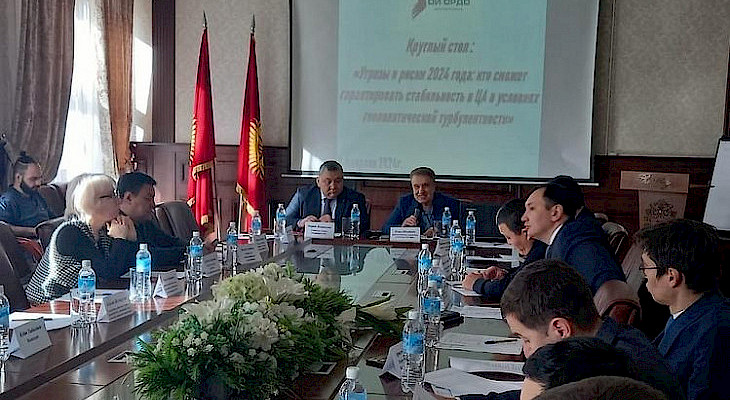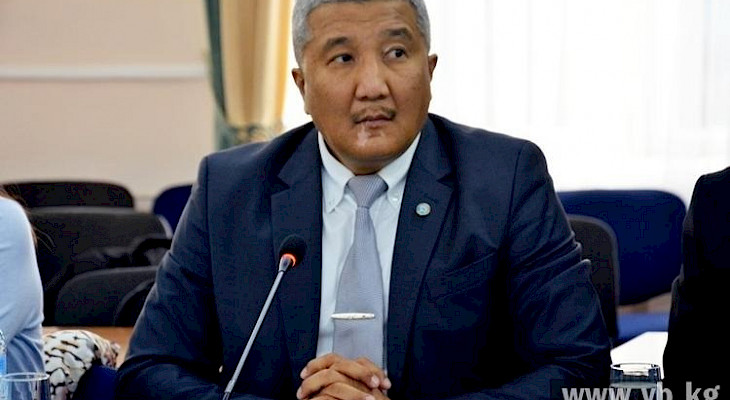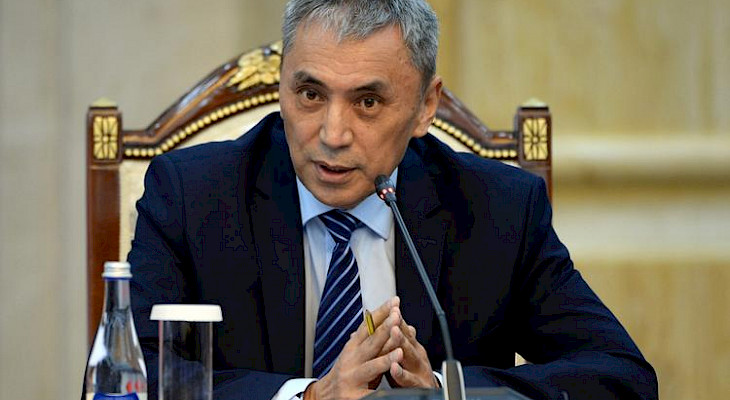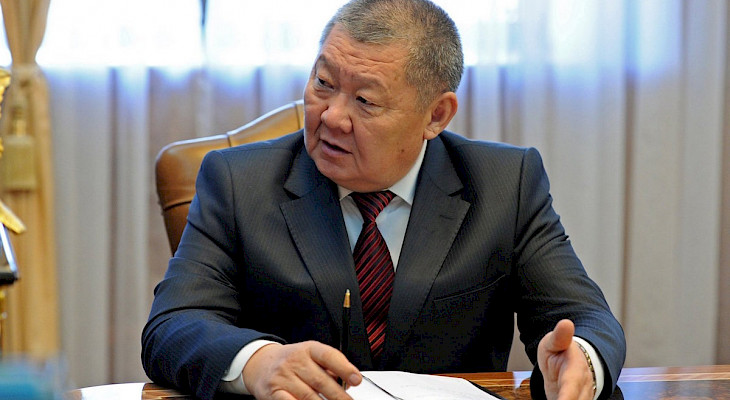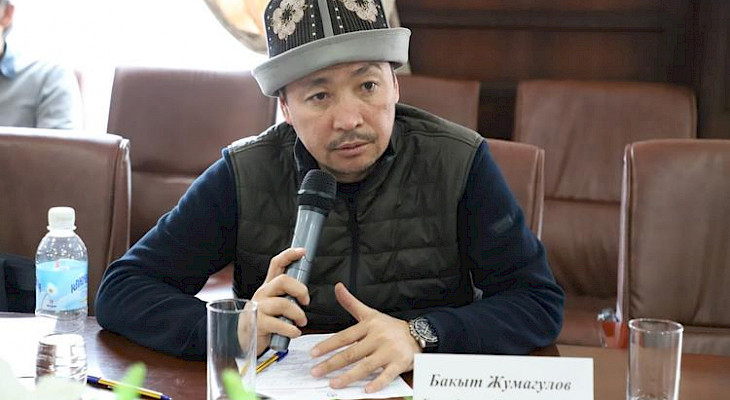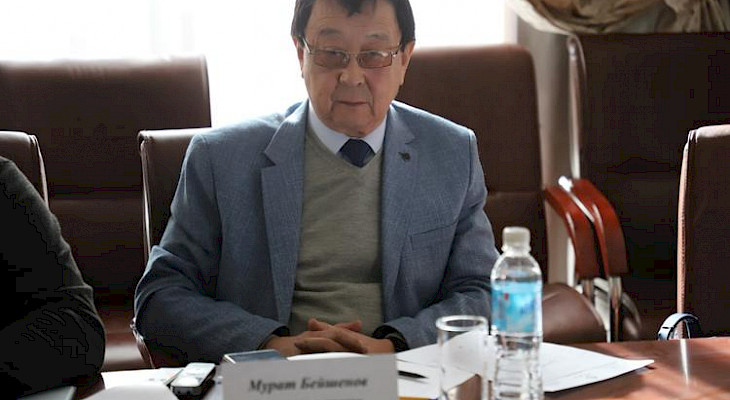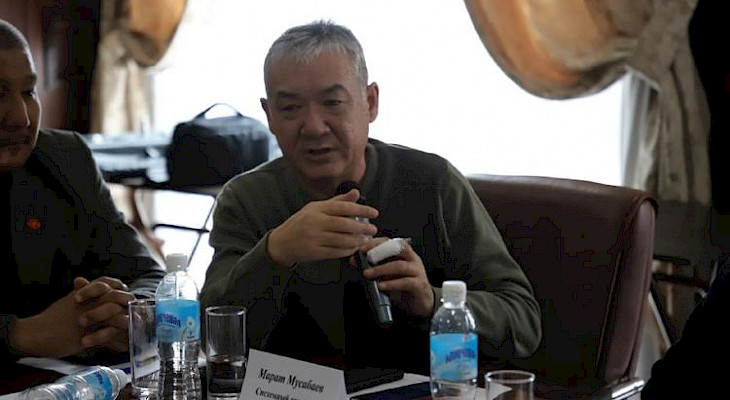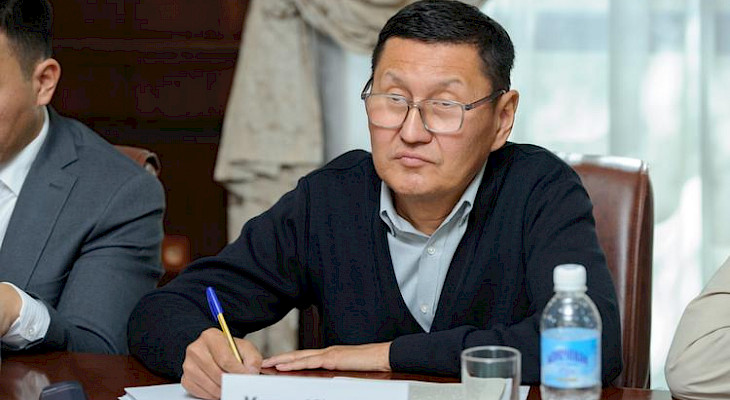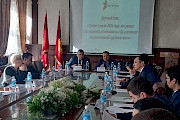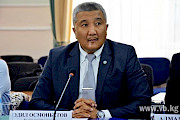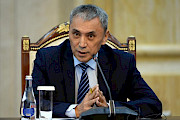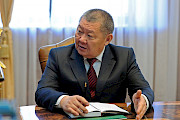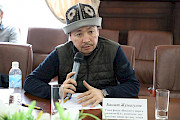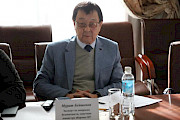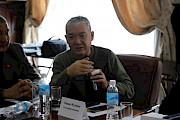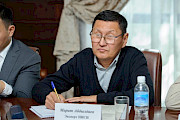International terrorism and the Afghan factor, water problems, and the escalating confrontation between global power centers – all these factors pose a serious threat to the security and stability of Central Asia.
According to experts, the only way to overcome the current threats in the region is through cooperation with each other, as well as with strategic partners and allies, primarily within such regional alliances as the CSTO and SCO. This was discussed during a roundtable titled "Threats and Risks of 2024: Who Can Guarantee Stability in Central Asia amid Geopolitical Turbulence," organized by the Center for Expert Initiatives "Oy Ordo."
As political analyst Edil Osmonbetov noted, over the past decade, global power centers have shown increased interest in Central Asia, and this trend is expected to intensify in the next two years for two reasons. Firstly, due to geopolitical confrontation among major players.

- Moscow's foreign policy priorities have shifted towards the East. Through Central Asia, Russia conducts parallel imports and circumvents sanctions, as the countries in our region are key partners of the Russian Federation. The second reason is that traditional logistic transport routes no longer exist, so new multimodal, aviation, road, and other corridors will be developed. In this regard, Azerbaijan has also been trying to join Central Asia in various formats over the past two years – as an observer or a participant," the speaker explained.
Speaking about regional threats, the expert mentioned the Afghan factor. According to him, Afghanistan is a regional problem that Uzbekistan has been trying to bring to the global security agenda for three years now, where it currently holds, perhaps, the third or fourth place. It is considered the concern of Central Asian countries, Iran, Pakistan, and partly the South Caucasus.
- The Taliban's renaissance has not occurred in two and a half years. They may know how to conduct military operations, but the economy is more challenging, especially since they lack funds for large projects. Therefore, a big question arises about where they got the funds for the construction of the Kush Tepe canal, which is being laid rapidly with an advance of 8-9 months. However, it should also be noted that they have the right to participate in water management and take up to 33% of water from the same Amu Darya because they haven't taken it for 45 years. It should be understood that with the full launch of the canal, the Taliban will undoubtedly have water keys to influence Uzbekistan and Turkmenistan primarily. Plus, they operate on the Helmand River with Iran and now with Pakistan. This indicates that the Afghan authorities are looking for drivers to interact with neighboring countries and specific tools for their recognition," shared Edil Osmonbetov's opinion.
He also noted that today the Taliban themselves face significant security challenges: "According to some reports, there are already more than 20 terrorist organizations present on the territory of Afghanistan. And this is a significant threat to them."
Supported by this idea in his speech, political analyst Kuban Taabaldiev also called the security situation in Afghanistan extremely tense, "considering that ISIS is still present in the country and occasionally makes itself known, along with armed groups led by Ahmad Masood Jr., who singularly heads the National Salvation Front of Afghanistan."

The speaker reminded that the Afghan government has spent over $700 million on the construction of the Kush Tepe canal. Additionally, the Afghan company DABS, dealing with electricity issues in the country, recently paid off debts for electricity imports to four countries – Iran, Tajikistan, Turkmenistan, and Uzbekistan – totaling $627 million.
- A reasonable question arises – where do the Taliban get such funds? Obviously, the country does not earn such funds. So, the Taliban have sources of financing that are not being discussed. It is noteworthy that recently the Taliban have been behaving more confidently on the international stage, as evidenced, for example, by their demand to admit a Taliban representative to the UN. There are also explicit statements by official figures that they intend to claim a share of the waters of the Amu Darya River, be present in Afghan embassies as official representatives. China has already accepted credentials from the Taliban ambassador, indicating that soon "doors" will open in other countries worldwide. However, the feeling that the main threat to stability and security for the Central Asian countries emanates precisely from the south does not diminish. The more the Taliban intensify on the international stage, the greater the concerns become," noted the expert.
He emphasized that each of the Central Asian states faces its own challenges, but questions related to ensuring security remain common to all: "The common border with Afghanistan is already noticeably affecting the situation in the countries of the region."
- These problems equally affect everyone, but the level of understanding of importance, and even more so the level of readiness for possible exacerbations, is very different. Take, for example, the Armed Forces. The positions of the Central Asian states in the rating of the state of the Armed Forces in 2023 are distributed as follows: Uzbekistan ranks 62nd, Kazakhstan one position lower – it is 63rd, Turkmenistan is in 82nd place, Kyrgyzstan is at 107th place, and Tajikistan is at 120th place. Thanks to this rating, you can see the difference in military power among the Central Asian five – the spread is almost 60 points. This indicates that the states are at completely different levels of combat potential, although in the world, this indicator becomes an increasingly important indicator of readiness to ensure one's security," the speaker shared information.
According to him, the defense capabilities of the countries are different. Therefore, the importance of uniting the armed forces or at least ensuring coordination of their interaction in the event of unexpected external threats becomes self-evident.
- Unfortunately, the countries of the region have not yet raised, discussed, or negotiated such joint actions, although the current situation strongly indicates the need for it. The question of uniting efforts to ensure stability and security in the region remains on the backburner. Efforts should be made in this direction for close cooperation, both among security services and the armed forces of the Central Asian countries," added K. Taabaldiev.
Similar views were expressed by Tokon Mamytov, Doctor of Political Science and Head of the Department of Political Studies at the National Academy of Sciences of Kyrgyzstan.
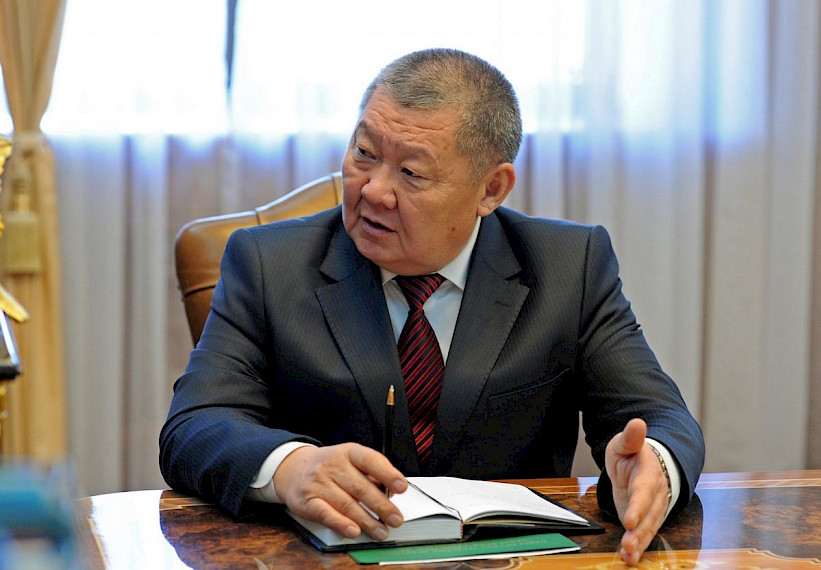
- If we do not demonstrate our determination and unity, no one will take us seriously; they will use us and tear us apart. Therefore, the most crucial issue is unity. Taking this opportunity, I would like to draw attention to the Cholpon-Ata initiative of the current President of Kyrgyzstan, Sadyr Japarov – this is an attempt to unite the Central Asian countries. For 32 years, we have been attempting, but we cannot unite. Our ego hinders us; the fact that we cannot differentiate between national and regional interests hinders us. And we need to do this, draw a thin line, thanks to which the national interests of each of the Central Asian republics will be taken into account, but at the same time, they will be accumulated and correspond to the common interests of the region. I suggest starting with water problems. We must have a common Central Asian hydropolitics, which will correspond to the water policies of each of the region's states," shared the speaker.
Bakytbek Jumagulov, the Director of the Center for Strategic Studies of Eurasia and a political scientist, expressed confidence that to reduce the risks and threats facing the region, Central Asian countries need to address internal problems first. He outlined the prerequisites for destabilization in the region.

- I would like to draw attention to events in which 800,000 people died. They occurred in 2010-2012 and still have a continuation in some countries. I mean the "Arab Spring," the slogan of which was "The people want the fall of regimes." In general, these processes, which started with Tunisia, were triggered by unemployment, corruption in the power system, shaping the key demands for socio-economic and political transformations, up to a complete change of power in these countries," the speaker recalled.
According to him, examining the events of the "Arab Spring," parallels can be drawn with events that took place in Europe in 1848-1849, known as the "Springtime of Nations." The consequences were the establishment of civil rights and freedoms, the elimination of the feudal system, the emergence of liberal-reformist political figures, the development of technologies, including print, leading to increased political awareness. New ideas and values of liberalism, nationalism, and socialism appeared in Europe.
- If we draw parallels between the events of 1848 and 2010 – the "Springtime of Nations" and the "Arab Spring," we will see that they had a common demographic factor – the growth of youth. The trigger for events in Europe was a severe crop failure in European countries in 1846. One of the factors that initiated events in the Arab world is attributed to the crop failure in Russia. The Russian authorities imposed a ban on grain exports, which significantly affected the rise in prices for products in the Arab-Muslim world, particularly in the countries of the Middle East.
Another common point is the development of information technologies. As I have already noted, in Europe by the mid-19th century, there was active development and politicization of mass media. In the Middle East, during the "Arab Spring," information technologies, predominantly social media such as Twitter, Facebook, etc., were actively used for mobilizing the population.
If we talk about the current situation in our region, special attention should be paid to the fact that events in Kazakhstan, Uzbekistan, Tajikistan, Kyrgyzstan since the early 2000s show that there are certain prerequisites and grounds for launching similar processes in Central Asia. These include the active development of artificial intelligence and social networks, which currently cover about 80% of the population.
The number of youth is actively growing in Central Asian countries. I witnessed events in Kyrgyzstan in October 2020, and I saw guys aged 18-20 who participated in these events. I noted for myself that during the first revolution, they were 5-7 years old. Now they have grown up and actively participate in socio-political processes," the expert said.
He emphasized that besides searching for external factors and conspiracy theories, it is very important to solve the entire complex of internal economic, social, and political problems that are on the agenda.
- After the tragic events in Kazakhstan in January, we observe that President Kassym-Jomart Tokayev is attempting a systemic solution to this complex of deep-rooted causes that became, so to speak, the reason for the processes that occurred. How is this issue being resolved in Uzbekistan – in Karakalpakstan? And in Tajikistan – in Gorno-Badakhshan? Therefore, answering the main question of today's round table, I want to emphasize that besides the countries of Central Asia themselves, no one can vouch for the security and development in our region," added B. Jumagulov.
In turn, Murat Baysenov, a candidate of philosophical sciences, former deputy minister of defense, and currently an advisor to the Minister of Defense of the Kyrgyz Republic, responding to the main question of the round table – who can guarantee stability in Central Asia amid geopolitical turbulence, emphasized that only the countries of the region themselves can achieve this.

Speaking about Kyrgyzstan, he put forward several proposals, such as exploring the possibility of the republic joining BRICS, submitting an application to join the union state of Belarus-Russia, and transforming the republic into a food hub. He also suggested initiating large-scale military exercises in the format of the CSTO plus China and Uzbekistan, involving 50-70 thousand personnel from the armies of participating states.
System analyst Murat Musabaev made a positive forecast, stating that there will not be a third world war in its classical sense, as interested parties lack the means to wage it.

- Any war requires money; without money, there is no war. Therefore, I view world history as a medal. On one side, certain political events, and on the other side – the development of world finances. The conception of the current world financial system occurred with the establishment of the English bank in 1694. Over the 17th to 19th centuries, the banking system evolved. The First World War did not erupt out of nowhere; it was prepared for 10 years, and only when everyone was ready did it start, along with the birth of the Federal Reserve System in 1913.
After the Second World War, the Bretton Woods agreements were signed, and the Federal Reserve System strengthened. For several decades, the world developed in this context. By the 90s, the system would have declined in principle, but the collapse of the Soviet Union provided an "artificial lung ventilation" for some time, and the system held on.
Today, the global financial system is an old lady. She has heart failure, pressure, and arthritis. Therefore, a global war is unlikely to start today because there is no one to pay for it – the old lady is no longer capable. She can finance specific conflicts but cannot sustain a global war," emphasized the analyst.
Marat Abdyldaev, an expert from the National Institute for Strategic Studies under the President of the Kyrgyz Republic, drew attention to the fact that the recent growing threats are not only directed towards Central Asia or small states like Kyrgyzstan.

- There are global problems, for example, when there is a clash between liberal views and more conservative views, as we see now in America. There are problems related to the overall financial and economic situation in the world, which give impetus to local problems," explained the speaker.
However, he supported the thesis that to prevent threats, Central Asian countries need to cooperate with each other and address their internal issues. Regarding Kyrgyzstan, the expert emphasized that the state should become more socially oriented.
- It seems to me that we need to move away from purely business perspectives, from the purely capitalist format of economic development. We cannot entrust everything solely to private business interests because, in the end, it will mean the takeover of our strategic economic objects, which will fall under the control of stronger economic entities, including transnational corporations.
State policy should be socially oriented. In this regard, I think we can learn from the experience of Western countries, where strong local self-government is the basis of democracy. We also have developments proposing stronger local self-government and certain mechanisms for the executive branch aimed at effective interaction within the entire system of state management," noted M. Abdyldaev.
He also added that Kyrgyzstan must adhere to its economic and military-political commitments, which it has undertaken within bilateral and multilateral agreements, including the Shanghai Cooperation Organization (SCO), the Commonwealth of Independent States (CIS), the Collective Security Treaty Organization (CSTO), and the Eurasian Economic Union (EAEU): "This will be a guarantee of security. I think this is correct and should not, in principle, cause any antagonism from Western states, as it corresponds to our national interests."
Source: Region.kg
Author: Natalya Lobanova
CentralasianLIGHT.org
February 15, 2024

